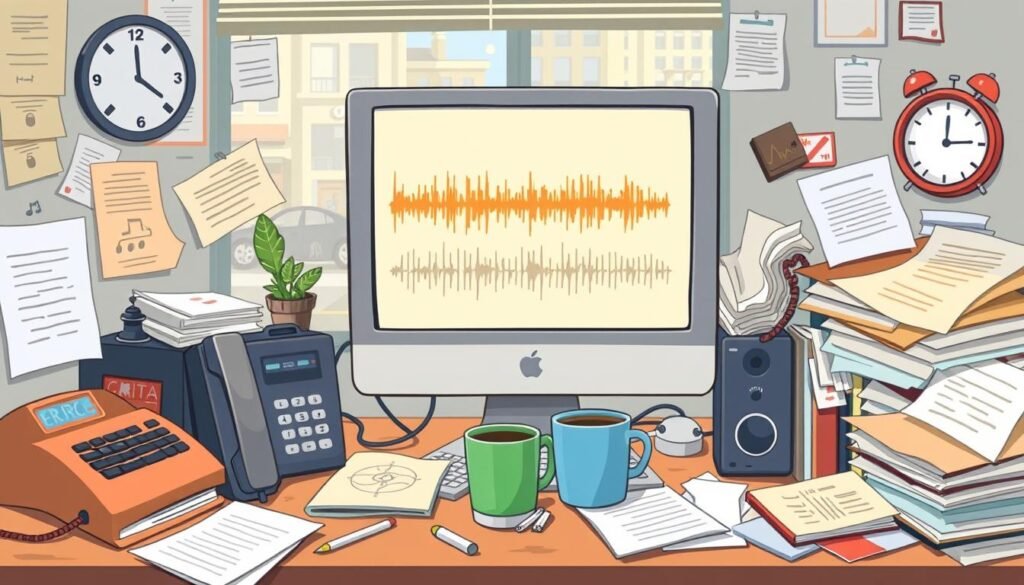AFFILIATE DISCLOSURE
This post may contain affiliate links. An affiliate means Escribr may earn referral fees if you make a purchase through our link without any extra cost to you. It helps to keep this blog afloat. Thanks for your support!
Did you know that by visiting this blog, you are doing good in the world? READ THIS.
Are you looking for a job that lets you work from home and set your own hours? 🤔 Becoming a transcriptionist might be your answer. In this guide, we’ll explore the world of transcription. We’ll cover the key steps to become a transcriptionist and all you need to know about this career.
Whether you’re new to transcription or want to improve your skills, you’re in the right spot.
So, grab a cozy seat and let’s start this journey to learn about transcription.
Understanding the Role of a Transcriptionist
Being a transcriptionist is like having a superpower. You turn audio or video into written text. This makes content accessible to everyone. 🦸♀️
Imagine sitting at your desk, headphones on, and typing fast. It’s not just typing; it’s an art. Here’s what you’ll do:
- Listening intently to recordings
- Typing accurately and quickly
- Understanding various accents and dialects
- Editing for clarity and punctuation
To do well, you need strong transcriptionist skills. You must be patient and detail-oriented. You’ll work with different subjects, like interviews and webinars.
Your job prospects can grow a lot in this field. The need for skilled transcriptionists keeps going up. Why not try this amazing job? 🌊
What Does a Transcriptionist Do?
So, what does a transcriptionist actually do? Imagine sitting at your desk, headphones on, ready to listen. Your job is to type out everything you hear, from interviews to speeches. It’s like decoding spoken words into text. 🎧
This job is more than just typing. You need to know grammar well, have a sharp ear for details, and be tech-savvy. It’s a fun challenge.🕵️♀️
As an audio detective, you’ll face tough tasks like understanding muffled voices or background noise. But with a transcription career, you do more than just type. You create important written records for research, legal documents, and more. Every certification opens up new skills and projects for you.
Are you ready to explore this exciting field? Knowing what a transcriptionist does is the first step to becoming great at it.
Types of Transcription Work
Transcription isn’t just one thing. There are many types of transcription work out there. Each one has its own special touch. Let’s explore them.
- General Transcription: This is great for beginners. It involves transcribing audio or video from various sources like interviews and podcasts. You get to learn about different topics, making it fun.
- Legal Transcription: This job is more serious. It’s about transcribing court hearings and legal documents. You need to know legal terms well and pay close attention to details.
- Medical Transcription: This is both tough and rewarding. Medical transcriptionists write down doctor’s dictations. You often need a medical background or certification. It’s a key role in patient care.
Every type of transcription work has its own benefits and challenges. It’s about finding what you enjoy most. 🌟
General Transcription: Getting Started
Diving into general transcription is like stepping into a candy store of job opportunities. 🍬 It’s an inviting field for beginners, as it requires no formal certification. You can start by transcribing podcasts, interviews, or even YouTube videos. It’s a fun way to build your confidence and skills.
Plus, who doesn’t love the flexibility? You can decide when and where to work—what’s not to love?
- Start by familiarizing yourself with transcription tools and resources.
- Engage in some transcription training to hone your skills, even if it’s just self-directed.
- Practice with different audio types to broaden your expertise.
- Network with other transcriptionists to share tips and find job leads.
Exploring Legal Transcription Opportunities
If legal jargon sounds exciting to you, consider jumping into legal transcription. This field offers unique opportunities for those willing to dive into the complex world of the law. Imagine mastering a whole new language—one where terms like “deposition” and “subpoena” become second nature. You’ll need specific training or certification to familiarize yourself with legal terms and procedures.
- Transcribing depositions
- Handling court proceedings
- Creating detailed records for attorneys
This type of transcription requires not only strong typing skills but also sharp transcriptionist skills to ensure accuracy and understanding of legal nuances. The responsibility is greater since even small errors can lead to significant consequences.
Medical Transcription: Requirements and Training
Starting in medical transcription is like entering a world full of medical terms and important patient info. It’s not just typing; you’re creating patient records. To do well, you need to meet certain requirements and get the right transcription training.
You’ll first need to learn a lot of medical terms. Knowing these terms is crucial for making accurate records for doctors. You also must understand HIPAA rules and patient privacy laws. This ensures patient info stays safe.
There are a few ways to get trained:
- Online courses that offer flexibility
- Community colleges with special degree programs
- Certification programs that increase your credibility
Choose a course that teaches both technical skills and ethics in medical transcription. It’s about making records accurate and keeping patient info private.
With good transcription training, you’ll become a key part of healthcare.
Essential Skills for a Successful Transcriptionist
To do well as a transcriptionist, you need a good mix of transcriptionist skills. First off, you should be a fast and accurate typist. Being quick helps you meet deadlines and stay on track.
Next, you need to listen well. You’ll be listening to audio that might sound like a mystery podcast. It’s important to catch every detail. Pay attention to tones and pauses, as they can change the meaning.
Knowing English well is also key. You should understand grammar, punctuation, and spelling. This makes your work look polished and professional.
Attention to detail is crucial. It’s like being a detective, always looking for mistakes. You’re ready to find the missing words.
And don’t forget patience. You might need to listen to parts over and over. It might seem slow, but it’s part of the journey. Just go with it.
Equipment Needed to Start Transcribing
You’ll need a computer, headphones, and reliable internet to start transcribing. These are the basics for your work-from-home transcription journey.
Some transcriptionists add more gear to their toolkit. Here’s a quick list of items that can boost your efficiency:
- Foot pedals: These devices let you control audio playback without using your hands. This keeps your focus on typing.
- Specialized transcription software: Tools like Express Scribe or Transcribe make managing recordings and text easier.
- Noise-canceling headphones: They block distractions and help you catch every word clearly.
Investing in quality equipment makes you work faster. A good setup improves your workflow and makes the job more fun.
How to Become A Transcriptionist
Becoming a transcriptionist is easy. You just need to brush up on your typing and listening skills.
A little transcription training is key. Look into online courses that teach transcription basics. These classes cover important topics like formatting and different transcription styles.
- Join transcription communities online to connect with others.
- Practice by transcribing your favorite podcast episodes or YouTube videos. This boosts your accuracy and speed.
- Invest in good quality headphones to catch every word.
Transcription Training Programs and Certifications
You can totally do transcription without any formal credentials. Still, taking some transcription training can be a game-changer. It gives you a strong foundation and helps you understand the nuances of the craft.
Many online courses are out there, specifically tailored to various fields like general, legal, and medical transcription. The beauty of these programs is that they often combine practical skills with theory, ensuring you’re well-prepared for the job. Just remember to dig into reviews before getting started. You want to make sure the transcriptionist certification you choose actually lives up to its hype.
- Seek out programs that match your career goals.
- Look for comprehensive training that includes real-world practice.
- Consider courses that offer support or mentorship.
Top Online Transcription Courses Available
Looking for the best online transcription courses? You’re in luck. There’s a wide range out there, from free YouTube tutorials to full programs from top schools. Some popular choices include:
- Skillshare classes – Great for hands-on learning.
- Udemy – Offers a variety of subjects to fit your needs.
Whether you’re on a tight budget or want to invest in your skills, there’s something for everyone. Think about what fits your goals and take the leap.
Finding Your First Transcription Job
The world of transcription is exciting, but where do we start? Websites like Rev, TranscribeMe, and Upwork have lots of job listings for beginners. Getting your first transcription job might seem tough, but it’s doable. 🎉
Don’t be afraid to start small. Short gigs can build your resume and boost your confidence. It’s like taking a first step into the water—soon, you’ll be swimming in job opportunities.

- Apply to several companies to increase your chances.
- Tailor your applications to showcase your skills.
- Keep an eye on social media platforms for job postings.
Stay positive and keep trying. Finding transcription jobs takes time, but each application brings you closer to your dream job. Remember, everyone starts somewhere.
Income Potential for Transcriptionists
So, how much does a transcriptionist make? Salaries vary a lot. They depend on experience, what kind of transcription you do, and where you work. ZipRecruiter says general transcriptionists usually earn about $40,000 a year. But if you specialize in legal or medical transcription, you could make a lot more. 💰
How much you make also depends on how fast and experienced you are. The more you transcribe, the faster you get. And that’s when you start to earn more. Here’s a breakdown of what you might earn:
- Entry-Level General Transcriptionist: Around $28,000 – $35,000 per year
- Experienced General Transcriptionist: Approximately $40,000 – $55,000 per year
- Legal Transcriptionist: Can make $60,000 annually and beyond
- Medical Transcriptionist: Potentially over $70,000, especially with certification
Keep working on your skills. As you get better and faster, you can ask for higher pay. Plus, transcriptionists often get to choose their own hours. This makes it easier to earn more.
Job Prospects in the Transcription Field
The demand for transcriptionists is on the rise. Companies are focusing more on making content and documents accessible. This means a lot of transcription job prospects are emerging. It’s like stepping into a candy store for transcriptionists—so many chances to find work. 🍬
Many fields, like healthcare and law, are looking for skilled transcriptionists. This is a great time to start in the field. Plus, if you want flexibility, remote work is perfect. Here are some key points:
- Growing need for accurate transcriptions in various sectors
- Flexibility to choose your hours and workload
- Ability to work from anywhere, including your cozy couch.
Patience and practice are key, but once you get the hang of it, the transcription job prospects really open up. Whether you’re new or looking to grow your skills, there’s a lot of potential here.
The Benefits of Working from Home as a Transcriptionist
Imagine sipping coffee in your PJs while making money. Welcome to the freelance transcription lifestyle. Working from home as a transcriptionist is incredibly liberating. You get to set your own hours and avoid the daily commute.
Picture this: you can create an environment that suits your productivity needs perfectly. Whether it’s working with your favorite playlist on or having a cute cat curled up on your lap, comfort fuels creativity.
- Flexibility: No more rigid office hours. You determine what hours work best for you.
- Work-Life Balance: Juggling personal life and work becomes so much simpler.
- Cost Savings: Save on gas, lunch out, and that fancy office wardrobe.
- Peaceful Environment: Say goodbye to noisy office chatter and hello to serene silence.
When you work from home as a transcriptionist, every day can feel like a cozy Sunday. So, if you love the idea of blending work with comfort, this gig might just be your dream come true.
Common Challenges Faced by Transcriptionists
Being a transcriptionist has its ups and downs. One big challenge is dealing with poor audio quality. It’s really tough when you’re trying to understand words but the audio is bad.
Another challenge is handling tricky accents or dialects. They add variety to conversations but can be hard to follow. 🎧
Staying focused during long sessions is also a challenge. Your mind might wander, and you might lose track of what’s being said. Using strategies like taking breaks or wearing noise-canceling headphones can help.
Overcoming these challenges is part of the job. Learning to deal with them can make you better at your job and help you grow personally.

Wrap-Up
If you’re good at typing and love flexibility, being a transcriptionist might be for you. Learning to become a transcriptionist isn’t hard. With the right training and effort, you’ll start a journey filled with chances to work on your own schedule from home.
When you start this career, focus on learning, getting real experience, and improving your skills. The transcription world is ready for people like you who are eager to join. Did you know your typing skills could lead to a rewarding and possibly profitable career?
Now, it’s time to get started. Hit that keyboard and begin your journey to become a transcriptionist. You’ll find that balancing work and life just the way you like it is possible. This could be the job you’ve always dreamed of.










